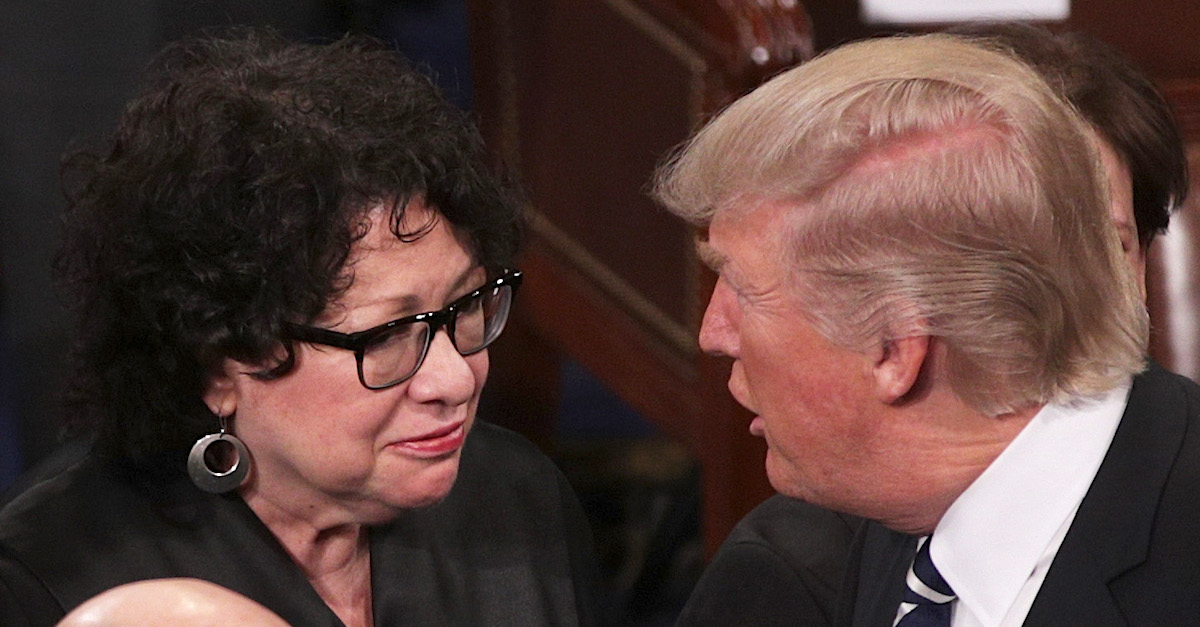
The Supreme Court of the United States released an unsigned order Tuesday evening, ruling that the COVID-19 pandemic is not a sufficient basis for preventing the U.S. Food and Drug Administration (FDA) from enforcing a rule requiring in-person pickup of abortion medication.
The American College of Obstetricians and Gynecologists sued when the Trump administration adopted a rule that bars access to abortion drug RU-486 (mifepristone) by forcing women to go in person to a medical provider in order to obtain the pill. As the COVID-19 pandemic raged during the summer of 2020, U.S. District Judge Theodore Chuang suspended the FDA’s “in-person requirements,” issuing an injunction in favor of the American College of Obstetricians and Gynecologists. Judge Chuang’s reasoning — that forcing women to travel to a medical provider instead of receiving medication by mail constituted a “serious burden to many abortion patients” — was particularly understandable in the context of a global health crisis.
The Trump administration next filed an interlocutory appeal with the U.S. Supreme Court, while continuing the litigation below. The FDA appealed directly to SCOTUS, asking that Judge Chuang’s order be stayed while the litigation proceeds. The Court took an unusual position in the case, and instead of ruling, SCOTUS ordered that the District Court reconsider the injunction.
Judge Chuang did reconsider, but ultimately decided to keep the injunction in place. Like many who were dismayed to find that the pandemic had not run its course by last summer, Judge Chuang found that COVID-19 continued to pose significant health risks necessitating the continued injunction. The present appeal followed. Now, SCOTUS has ruled in favor of the FDA.
In a brief concurrence to the unsigned order, Chief Justice John Roberts wrote, “The question before us is not whether the requirements for dispensing mifepristone impose an undue burden on a woman’s right to an abortion as a general matter.” Rather, continued the Chief Justice, “The question is instead whether the District Court properly ordered the Food and Drug Administration to lift those established requirements because of the court’s own evaluation of the impact of the COVID–19 pandemic.” In Roberts’ opinion, courts “owe significant deference to the politically accountable entities” that have the “expertise to assess public health.”
Justice Stephen Breyer would have sided with the Court’s more liberal justices and denied the stay of Chuang’s order. Notably, however, Justice Breyer declined join in Justice Sonia Sotomayor’s dissent along with Justice Elena Kagan.
Sotomayor called the FDA’s in-person pick up requirement for mifepristone “unnecessary, unjustifiable, irrational, and [an] undue burden on women seeking an abortion during the current pandemic”; she pointed out that medical consultations prior to abortions are permitted to be carried out via telemedicine, and mifepristone is available at retail pharmacies. The justice laid out some grim statistics regarding COVID-19 cases, and noted, “The COVID–19 pandemic has thus made many typical activities more difficult and dangerous. A trip to the doctor’s office is no exception.”
Sotomayor railed against the Trump administration’s inconsistent positions, writing that while it has seen fit to help patients “‘access healthcare they need from their home, without worrying about putting themselves or others at risk during the COVID–19 outbreak,’” it has “has refused to extend that same grace to women seeking medication abortions.” The justice said that although women see their doctors virtually, ingest the drugs unsupervised at home, and suffer any complications “long after the patient has left the clinic,” they are still required to make an in-person pickup of the drug itself.
Justice Sotomayor continued to argue that the Court’s ruling posed special risk to marginalized communities.
“[M]ore than half of women who have abortions are women of color,” wrote the justice, “and COVID–19’s mortality rate is three times higher for Black and Hispanic individuals than non-Hispanic White individuals.”
“On top of that, three-quarters of abortion patients have low incomes, making them more likely to rely on public transportation to get to a clinic to pick up their medication. Such patients must bear further risk of exposure while they travel, sometimes for several hours each way, to clinics often located far from their homes,” Sotomayor added.
Furthermore, the risk posed by the FDA’s requirement disproportionately affects not only the women seeking abortions, but their entire families.
“Finally minority and low-income populations are more likely to live in intergenerational housing,” said Justice Sotomayor, “so patients risk infecting not just themselves, but also elderly parents and grandparents. These risks alone are significant deterrents for women seeking a medication abortion that requires in-person pickup. The obstacles are even greater, however, because medical offices have dramatically reduced availability during the pandemic.”
Recognizing that the country’s laws have “long singled out abortions for more onerous treatment than other medical procedures that carry similar or greater risks,” Sotomayor urged: “One can only hope that the Government will reconsider and exhibit greater care and empathy for women seeking some measure of control over their health and reproductive lives in these unsettling times.”
Because the Court’s ruling relates to an administrative rule (as opposed to a statute), it may not have practical effect for more than seven days. The incoming Joe Biden administration will have the authority to eliminate or simply decline to enforce the FDA rule adopted by the Trump administration.
[image via Alex Wong/Getty Images]